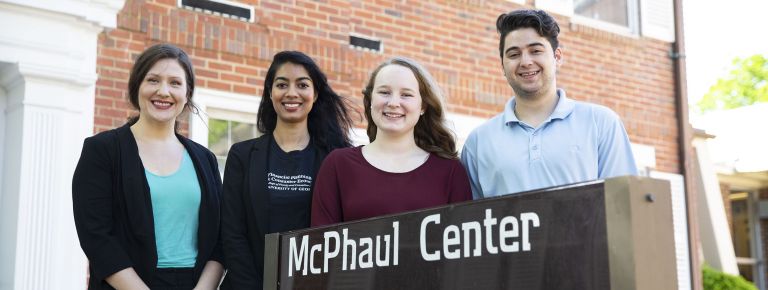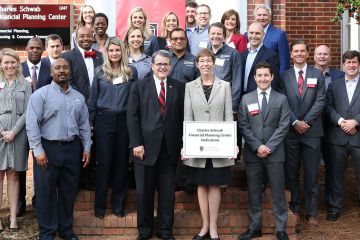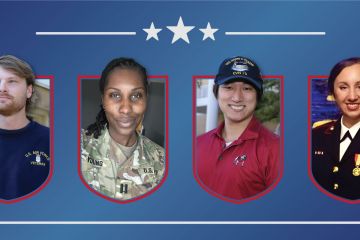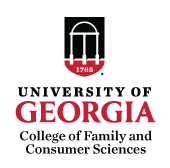Beyond the Books
Dana Carney remembers the anxious moments before her first counseling session with a client.
“I was a mess,” she said.
The financial planning student had spent years reading about how to interact with clients seeking financial advice.
She had a general idea of questions to anticipate and had even developed a little script in her head.
“I practiced my intro on my roommate the night before,” she said. “It was not good.”
It turns out the emotions experienced by Carney, a financial service provider at the ASPIRE Clinic, are pretty common.
Through repeated sessions, and time-intensive training with faculty, a common theme emerges: those fears gradually dissipate and students develop more confidence.
“Now,” Carney said, “if I get a new client, the first session is my favorite. Now, it’s more like ‘I want to know everything about you.’ Going from super messy Dana to ‘I’m so excited to meet this new client’ Dana was definitely a huge change I did not see coming.”
The ASPIRE Clinic, established by FACS in 2008 to provide experiential learning opportunities for students and to conduct interdisciplinary and holistic research, is a veritable crucible for future practitioners.
Student service providers in the clinic provide advice on topics ranging from nutrition education to finances to individual, couple and family therapy as well as legal problem solving, offered in partnership with the UGA Law School.
Service providers are graduate students supervised and mentored by Megan Ford, ASPIRE Clinic Coordinator since 2011, and other licensed or certified faculty members. Some undergraduates in financial planning are involved as well, in partnership with graduate students and faculty.
Here, theories and hypotheticals discussed in the classroom intersect, often shockingly, with real-life clients with real-life problems.
“This is not a problem out of a textbook anymore,” financial planning student
Meera Saj said. “You’re actually dealing with people’s lives and that responsibility is heavy on your shoulders.”
The result, Ford said, is a real-life experience that adds depth and value to their education.
“You see this acceleration of their learning and I think they really gain a sense of purpose from being in that role and being relied upon by people,” Ford said.
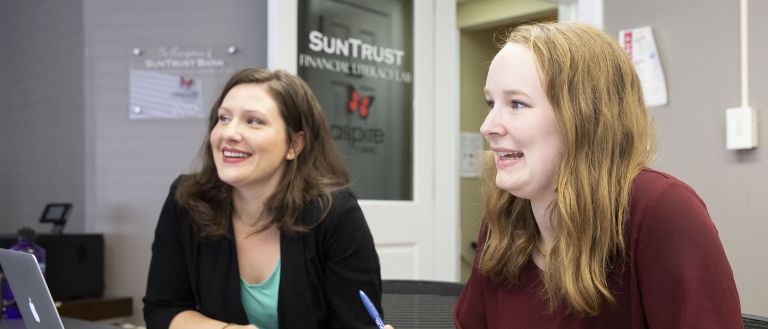
(Top Left) Josh Boe, marriage and family therapy student, provides services under the state-required supervision of licensed marriage and family therapists. (Right) Walsdorf and Carney discuss client strategies.
The clinic had 49 student service providers representing four different professions working directly with clients in 2017.
Last year, the clinic served more than 250 people, about half of which were from UGA and the other half from the Athens community. Roughly half reported their income as $40,000 a year or less.
While the benefit to the Athens and UGA community is tangible – Ford said clients have come from as far away as Atlanta for low and no-cost services – the impact on the student service providers is immeasurable.
Taylor Newman is pursuing a Ph.D. in the FACS department of foods and nutrition, and even though she completed a dietetic internship at ASPIRE as part of her master’s degree requirements, she decided to continue working with her lone client.
“A lot of students, including myself, really enjoy it, so we stick around and stay with our clients and see how they grow,” Newman said.
The biggest surprise of the experience, Newman said, is the complexity of the issues ASPIRE Clinic clients report.
“You think ‘Oh, I can just hand them a recipe card,’ ” Newman said. “It’s not that simple. There are so many factors that affect what they eat, and that’s just the tip of the iceberg. There are socioeconomic factors, mental, physical ability, family history, disease state, all these things that affect what they eat. You have to take everything into account.”
The beauty of the clinic, Newman said, is Ford and student service providers from other disciplines collaborate in the same space, allowing for what Ford calls a “cross pollination of knowledge and experience,” ultimately benefiting both the client and student.
In Newman’s case, she was able to consult with a student service provider from financial planning and eventually hold a joint session with the client to create a food budget, one of the areas in which the client needed support.
The holistic, collaborative strategy allows service providers to offer the client a more comprehensive healthcare approach, Newman said.
“Working in ASPIRE has made me realize the complexity of nutrition,” she added. “When you’re in the classroom, you can read about socioeconomic factors and all those things, but until you talk with a person and they continually bring up reasons why it’s not going to work, you’re never going to realize how multi-faceted issues around nutrition can be.”
It’s this “co-therapy” approach that makes the clinic so unique and so effective, said Ashley Walsdorf, a Ph.D. student in the FACS marriage and family therapy program.
“The truth is, for the families who come here, those services aren’t separate for them,” Walsdorf said. “For us to separate them, it’s not how real life works. It’s much more effective to get everyone in a room together. You’re actually talking about all the issues, and that’s been really transformative for me.”
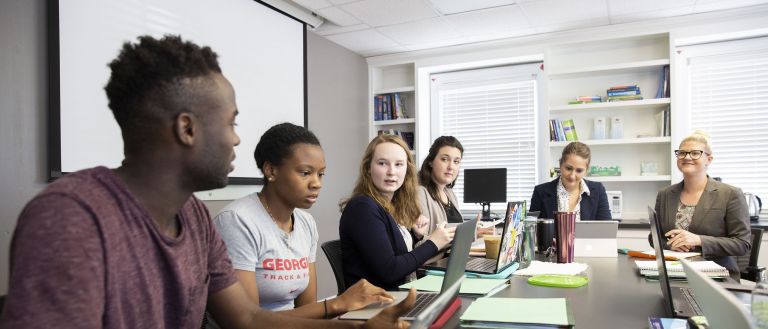
Financial planning students and ASPIRE Clinic service providers Muhozi Aimable, Keturah Orji, Dana Carney and Paige Garrison collaborate on strategies to best help their clients.
Bryan Kamau didn’t know what he wanted to do when he entered UGA four years ago.
Late in his freshman year, he took an intro to personal finance class in FACS and knew he had found his home.
His first interaction with actual clients came through the Volunteer Income Tax Assistance (VITA) program, designed to provide free tax preparation to low-income Athens residents.
Under the supervision of faculty member Lance Palmer, Kamau’s confidence grew.
“Getting that hands-on experience with clients made a big difference,” he said. “I gained something from VITA that I don’t think can be replaced.”
That experience prepared him well for his time as a financial service provider at the ASPIRE Clinic.
His time working with clients in the clinic, “seeing a light go off in their head” after explaining a credit score or helping a family create a budget, convinced him he chose the right path.
Emboldened by these experiences, he will begin his career with UBS Wealth Management at its office in New Jersey, grateful for his time in the clinic.
“Just to know I’m making an impact on someone’s life goes so much farther than getting a 100 on a test,” he said. “To see the joy on their face, that was eye opening to me.”
